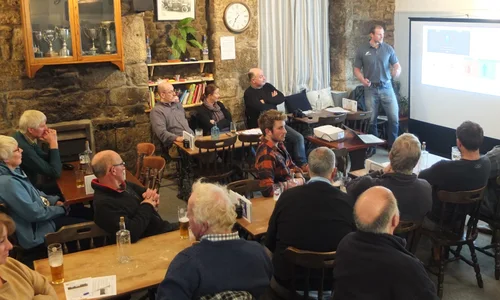 On Tuesday 26th November a group of approximately 25 people gathered at the St. Buryan Inn to hear about the progress of the Livestock Demonstration Units as part of the Penwith Landscape Partnership Farming Futures project. These units are kindly being hosted by The Hosking Family of Boskenna Home Farm (Organic – Suckler Beef) and The Hichens Family of Carne Farm, Morvah (Dairy). The evening was led by the project consultant, James Daniel of Precision Grazing.
On Tuesday 26th November a group of approximately 25 people gathered at the St. Buryan Inn to hear about the progress of the Livestock Demonstration Units as part of the Penwith Landscape Partnership Farming Futures project. These units are kindly being hosted by The Hosking Family of Boskenna Home Farm (Organic – Suckler Beef) and The Hichens Family of Carne Farm, Morvah (Dairy). The evening was led by the project consultant, James Daniel of Precision Grazing.
James began the evening by asking the question; ‘is meat a threat to our planet?’ James examined the roll of livestock production in terms of methane output and the efficiency of production systems. James pointed out that although methane has a much higher warming effect than CO2 it’s has a very short lifespan of only 10 years, whereas carbon dioxide can last thousands of years. It was also recognised that the soil plays a very important part in storing carbon, with each one percent rise in soil organic matter leading to an extra 13.92 tonnes of carbon per hectare being sequestrated from the atmosphere.
A very interesting part of the presentation covered the fact that two thirds of the agricultural land on earth is ‘marginal’ and only good for growing grass, and not suitable for cropping. It showed that only ruminants were able to turn this huge amount of pasture into nutrient rich sources of protein that can be used by human beings for the processes of life and growth. This kind of pasture based meat production was with a high percentage of output coming from grass/forage produced, and a finished product with a high ratio of omega 3’s to omega 6’s compared to grain based. James pointed out that France has a specific brand which guarantees a ratio below 1:5.
James than went on to present the data that had been collected by the demonstration farmers. In the first case study working with the Hosking family, James demonstrated the importance of good quality data he explained that the key indicators to overall ‘Suckler Herd Efficiency’ were the calving index and the percentage Weight Weaned at 200 Days, with overall farm gross margin being affected by increasing the weight of calves weaned from lighter weight cows.
In the second study James explained, in the case of the Hichens’s dairy unit, that overall ‘Farm Pasture Efficiency’ was critical to increasing profitability. James also highlighted the need to identify the most productive fields on a given grazing platform and looking at the reason why all fields are not producing grass at that level. It was also identified that herbal leys can play an important part in a range of types of grass grown on the farm helping maintain a level production of forage during the drier months of July / August when perennial ryegrass growth naturally dips. Once again the mature weight of the cow came to the fore, with lighter cows being more efficient than heavy ones particularly in terms of the energy used for maintenance.
There was ongoing questioning throughout the evening and attendees were very keen to look at the next step in the project. James said it was to improve farmers’ business profitability whilst enhancing the landscape, and would like to work with Penwith livestock farmers over the next 12 months in the following areas; rotational grazing, measuring pasture output, increasing the clover content of grass leys, and the use of diverse swards while reducing fertiliser inputs. He also asked is Penwith produce nutrient dense by default; and what the current status of our carbon emissions is. James explained that over the next year there would be a variety of ways to improve the efficiency of grazing and that farmers’ information would be disseminated via a discussion group, on-farm advice and visits etc. The evening was rounded off with an excellent buffet provided by our hosts at the St. Buryan Inn. If you have any other ideas and would like to work with James please contact him on the number below.
Increasing pasture grown provides opportunity to reduce or eliminate nitrogen fertiliser and purchased feed which saves cost, improves food quality and reduces carbon footprint. In addition to the work James has been doing with our demonstration farmers, he has received a number of enquiries about running a training day on measuring farm carbon footprints. We are keen to support this, the NFU has proposed that UK agriculture will be carbon neutral by 2040, perhaps with an already grazing and forage based system Penwith livestock farmers could achieve this by 2025………? If you are interested in attending this kind of event, please get in touch by emailing info@precisiongrazing.com or contacting James on 07534 930484.



